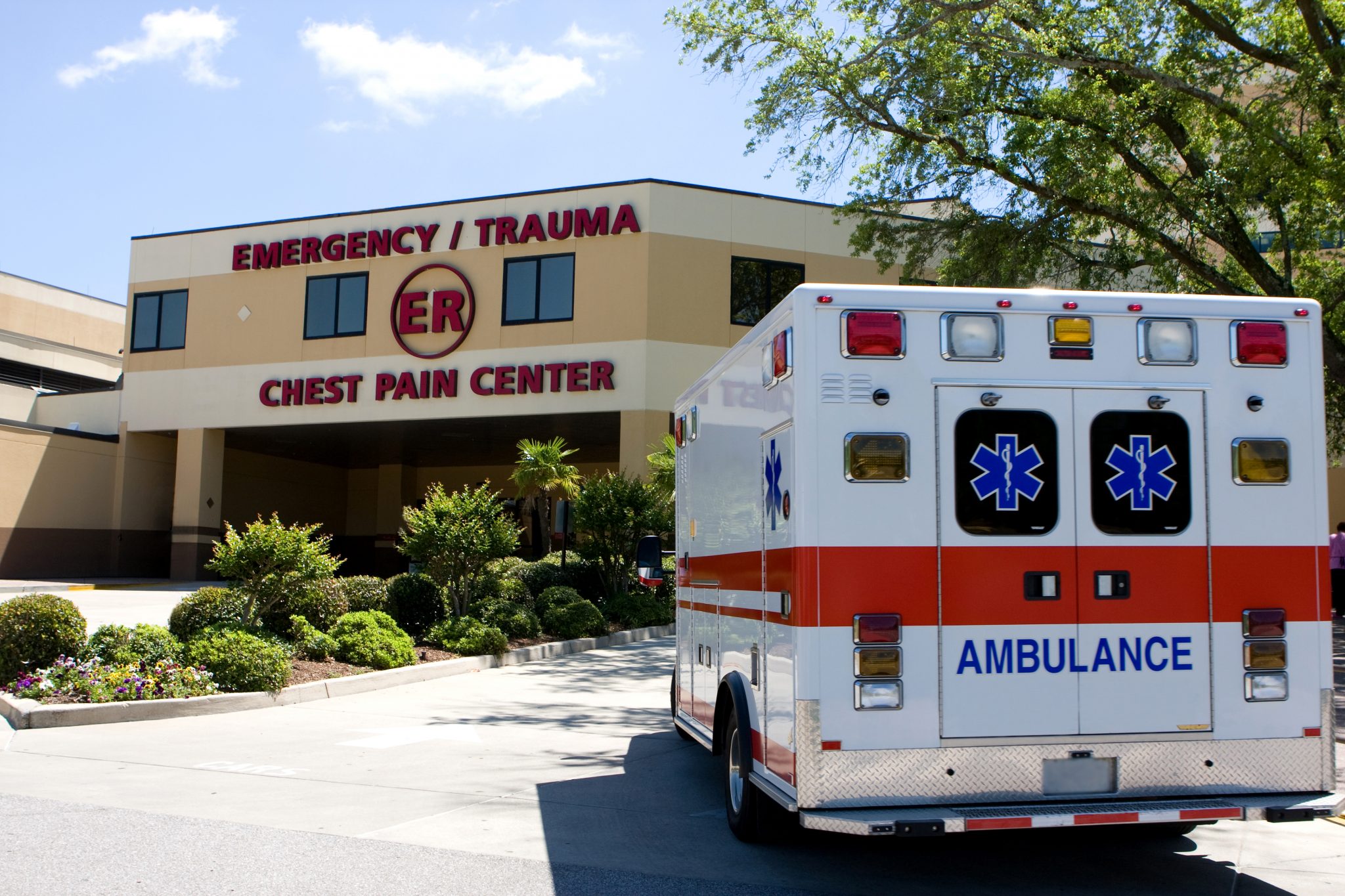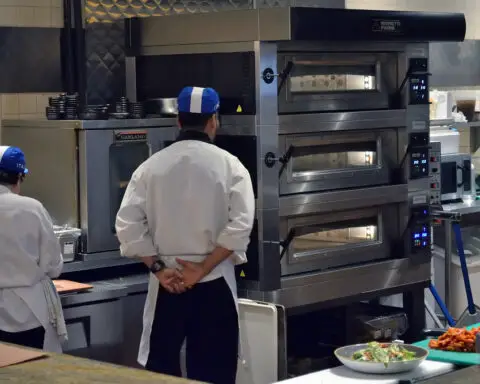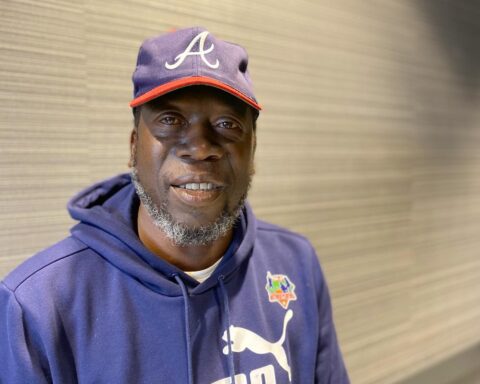From car accidents to gunshot wounds to bicycle crashes, some major Georgia hospitals are reporting an increase in trauma cases since the COVID-19 pandemic began.
Grady Memorial Hospital has seen a 25 percent rise in trauma cases. Such injuries have reached the highest level that CEO John Haupert has seen since he arrived at the Atlanta safety-net hospital in 2011.
Haupert said recently that almost every day since early June, Grady has treated at least one gunshot wound.
Increases in ‘‘blunt force trauma,’’ such as car crashes and falls, and in ‘‘penetrating trauma’’ like gunshots and stabbings also have risen at large hospitals in Columbus, Marietta and Albany.
It’s by no means a universal trend, either in the state or the nation. The Trauma Center Association of America said in May that overall trauma statistics appeared to be on the decline nationally, driven by a decrease in blunt trauma, while injuries from gunshots and stab wounds were not dropping.
But car crash injuries aren’t falling at Grady. Dr. Hany Atallah, chief of emergency medicine at Grady, speculates that some people are driving faster with less traffic to battle on normally jammed roads in metro Atlanta.
The Georgia State Patrol told the AJC in April that while it was writing far fewer traffic tickets than normal, tickets for speeding at 100 mph or more were up nearly two-thirds statewide from a year ago. That superspeeder trend is also reported by local police.
The overall trauma situation “should be looked at carefully,’’ Atallah told GHN this week. “This pandemic has been hard on everybody. It’s been challenging for people to cope.’’
Marietta-based Wellstar Health System is reporting an across-the-board increase in trauma cases, including a rise in suicide attempts and domestic violence injuries.
At Piedmont Columbus, trauma cases are up 25 percent this year during the COVID-19 pandemic.
All types of cases have increased, said Mary Bizilia, manager of the trauma program at Piedmont Columbus. But she also noted a 45 percent increase in bicycle-related injuries. “Kids are just riding around everywhere without helmets,’’ she said. And the hospital is seeing more adult bike crashes, too.
The Columbus hospital is treating more victims of falls, notably from ladders, she added. “More people are at home doing home improvement projects’’ because of the COVID-related lockdown, Bizilia said.
Piedmont is emphasizing bicycle safety and working with Home Depot and Lowe’s on consumer safety information.
The Medical Center, Navicent Health, said it saw a 15 percent drop in the number of trauma admissions at the Macon hospital between March and August when compared to previous years, but that motor vehicle accidents have trended up this year.
Phoebe Putney Memorial Hospital in Albany, which was flooded with COVID patients early in the pandemic, reports a big jump in trauma cases beginning in May.
Drinking on the rise
Coinciding with these trauma cases are increases in alcohol use, which experts link to stress and mental health issues created by the pandemic. Rising unemployment and divisive social issues are playing into the general anxiety among Americans, experts say. COVID-19 has disrupted daily life for people in many profound ways.
U.S. adults have sharply increased their consumption of alcohol during the pandemic shutdown, with women increasing their heavy drinking episodes (four or more drinks within a couple of hours) by 41 percent, according to a new RAND Corp. study.
A national survey found that the overall frequency of drinking alcohol increased by 14 percent among adults over age 30, compared to the same time last year. The increase was 19 percent among all adults aged 30 to 59, 17 percent among women, and 10 percent among non-Hispanic white adults.
Michael Pollard, lead author of the study at RAND, a nonprofit research organization, said in a statement that “alcohol consumption can have significant negative health consequences, so this information suggests another way that the pandemic may be affecting the physical and mental health of Americans.”
George Koob, director of the National Institute on Alcohol Abuse and Alcoholism, told CNN that the U.S. has seen similar increases in alcohol consumption during other times of crisis, such as after the 9/11 terrorist attacks and some recent hurricanes.
Dr. Andrew Lawson, a trauma surgeon at Augusta University Health, told GHN that the number of intoxicated individuals in hospital trauma cases has increased during the period from late February through June.
The overall number of trauma cases is about the same as in previous years, Lawson said. But he added that while he doesn’t have the data yet, it appears that Augusta hospital had a rise in trauma cases in July and August.
Substance abuse
There’s ample evidence that drug use is up as well.
The CDC found that during a week in June, U.S. adults reported considerably elevated adverse mental health conditions associated with COVID-19. Younger adults, racial/ethnic minorities, essential workers and unpaid adult caregivers reported experiencing disproportionately worse mental health outcomes, increased substance use, and elevated suicidal ideation (i.e., thoughts about suicide), the CDC reported.
In Georgia, Public Health officials recently reported a troubling increase in overdose cases in hospital emergency rooms.
‘‘Recovery coaches’’ who help substance abuse patients in ERs and on a consumer hotline have seen an increase in people needing help during recent months, according to the Georgia Council on Substance Abuse.
“Not only has the volume increased, the intensity of the encounters has increased as well,’’ said Neil Campbell, executive director of the organization. “Our coaches are reporting just some devastating life situations that their peers in the EDs [emergency departments] are experiencing that have been compounded by COVID.’’
The people who call needing help “are reeling from isolation due to COVID, the economic downturn and the social and racial justice issues happening in their communities,’’ she added. “The duration, intensity and volume of the calls have all increased.’’
Drug overdose deaths are not classified as trauma cases. But they are part of the deaths of despair (along with suicides and alcohol-related deaths) that have drawn media attention recently.
The state’s Department of Public Health said preliminary results show that compared to the previous 15 weeks, the state experienced from March 15 through June 27:
▪ A 9 percent increase among all drug overdose deaths
▪ A 25.3 percent increase among opioid-involved overdose deaths
▪ A 32.3 percent increase among heroin-involved overdose deaths
▪ A 61.4 percent increase among fentanyl-involved overdose deaths
And nationally, the American Medical Association warned in Augusta that more than 40 states have reported increases in opioid-related mortality.
More shootings
Gun-related violence has jumped in Atlanta and elsewhere in the country during recent months, clearly having an influence on the trauma workload.
Police departments in Chicago, New York and Philadelphia reported a higher number of shootings and homicides compared with the same period last year.
Atlanta saw a particularly dramatic rise in gun-related crime, compounding the unrest in a city that has been a center of protests over police brutality and racial justice, the Wall Street Journal reported in July.
As of July 11, 106 people in Atlanta were shot over a 28-day period, marking a sharp increase from 40 people during the same period in 2019, according to data compiled by the Atlanta Police Department.
The violence stems from many factors. The AJC cited pent-up energy and angst from quarantine; people trying to handle disputes themselves rather than call police; and Atlanta officers working less proactively because of what they see as anti-police sentiment on the streets and a lack of support from local politicians.
Atlanta Mayor Keisha Lance Bottoms said in a July news conference that “the reality is this: These aren’t police officers shooting people on the streets of Atlanta, these are members of the community shooting each other.”
Overall serious crime in Atlanta, though, is actually down about 20 percent for the whole year, WSB-TV reported last month.
Lots of ways to get hurt
Wellstar Health System, with trauma hospitals in Atlanta, Marietta and Roswell, has seen increases in traumatic injuries from bicycle accidents and from incidents involving camping or hiking, as people working at home seek new activities, Dr. Bill Mayfield, chief surgical officer for Wellstar, said Friday.
The rise in trauma cases “came as really a complete surprise,’’ he added.
The trends also include more suicide attempts and more domestic violence.
The latter has shown up often in stabbings and gunshot wounds, Mayfield said.
Elder abuse injuries are also increasing, said Rebecca Gomez, clinical health psychologist for Wellstar Medical Group.
Admissions from suicide attempts at Wellstar have increased 26 percent since last September, Gomez added. The patients show up with overdoses or wounds from cutting or gunshots, she said.
Gomez links this troubling increase to the mental health strains caused by COVID-19. That includes financial distress, social unrest, isolation, unmanaged mental health problems, and general uncertainty over the pandemic.
“We aren’t engaging socially,’’ Gomez said. “We’re not engaging in coping strategies.’’
She said that during the pandemic, people need to reach out to family, friends and neighbors. Health care providers should regularly screen for mental health issues, Gomez said.
Mayfield, who has lost a son to suicide, said that “society itself can increases awareness and openness to conversations’’ to people who may have suicidal thoughts. “We all can participate in saving some of these lives.’’
Wellstar shared the following resources to get help:
The Georgia Crisis and Access Line (GCAL) 1-800-715-4225 https://www.georgiacollaborative.com/providers/georgia-crisis-and-access-line-gcal/
The National Crisis Text line https://www.crisistextline.org/ Text HELP to 741-741
National Suicide Prevention Lifeline 1-800-273-8255 https://suicidepreventionlifeline.org/
Disclosure: This article may contain affiliate links, meaning we could earn a commission if you make a purchase through these links.






